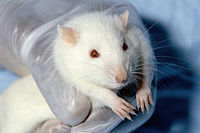
Photo from wikipedia
Abstract Cognitive testing programs are being implemented more frequently in zoo settings due to the benefits these programs can provide for the animals, researchers and zoo visitors. However, the impact… Click to show full abstract
Abstract Cognitive testing programs are being implemented more frequently in zoo settings due to the benefits these programs can provide for the animals, researchers and zoo visitors. However, the impact that cognitive studies have on the welfare of captive animals, particularly for primates in a social group, is debated. Although cognitive testing can be mentally enriching, the provision of monopolisable apparatuses to a primate social group can elicit competition and potentially contribute to negative welfare. We sought to investigate how behaviours changed when a group of 12 Japanese macaques had access to two touchscreen devices. We assessed rates of affiliative behaviours, anxiety-related behaviours, general activity, and aggression over 15 months at matched time periods on days when cognitive testing was available and when it was not. Rates of affiliative behaviours, anxiety-related behaviours, and general activity were not significantly different between conditions. Rates of contact and non-contact aggression were significantly higher during cognitive testing compared to times without cognitive testing (p
Journal Title: Applied Animal Behaviour Science
Year Published: 2019
Link to full text (if available)
Share on Social Media: Sign Up to like & get
recommendations!